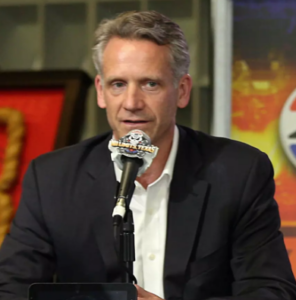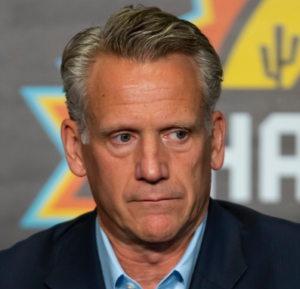The lawsuit filed by 23XI Racing and Front Row Motorsports against NASCAR is a pivotal moment in the sport’s history
At stake is not just the financial future of two teams but the fundamental dynamics of power, revenue sharing, and governance in American motorsports.
The outcome of this case will likely have far-reaching implications for NASCAR and could signal a shift towards a new era of collaboration between the league and the teams that drive its success.
For fans and stakeholders alike, the ongoing legal saga is a reminder that in the high-speed world of NASCAR, the battles off the track can be just as intense as those on it.
For the teams, the lawsuit represents an opportunity to claim their share of NASCAR’s growth and ensure their survival in an increasingly competitive industry.
A settlement could avoid the risks of a drawn-out legal battle, which might damage the league’s reputation and strain relationships between NASCAR and its teams. However, whether both sides are willing to compromise remains uncertain.

Also Read: Kelley Earnhardt (NASCAR): Who Is She? Bio, Wiki, Age, Career, Personal Life and More
Table of Contents
Steve Phelps: NASCAR’s Charter Dispute
A Legal Battle in the Fast Lane
The motorsports world was jolted on October 2 when two prominent NASCAR teams, Michael Jordan’s 23XI Racing and Bob Jenkins’ Front Row Motorsports (FRM), filed a lawsuit against NASCAR and its CEO Jim France.1
This lawsuit, which accused the racing organization of monopolistic practices, brought into the spotlight issues long simmering beneath NASCAR’s high-speed thrills.
With NASCAR President Steve Phelps finally breaking his silence, fans and industry insiders are gaining insight into the tensions surrounding the league’s charter system.
Here’s an in-depth look at the legal challenges, charter negotiations, and the broader implications for NASCAR’s future.
The Lawsuit’s Core: Antitrust Allegations
At the heart of this legal showdown is the assertion that NASCAR’s practices amount to monopolistic control over the sport.
Michael Jordan’s 23XI Racing and Bob Jenkins’ Front Row Motorsports allege that NASCAR’s charter system and revenue distribution mechanisms create an anti-competitive environment.
This lawsuit has stirred discussions about whether NASCAR holds excessive sway over critical aspects of the business, including team ownership rights, revenue sharing, and operational governance.
Antitrust issues are not new in the sports world; however, in a sport like NASCAR, where team investments can run into millions of dollars, these issues become particularly intense.
The case highlights deep-seated concerns that NASCAR’s policies potentially hinder teams’ growth and restrict them from fully capitalizing on their investments.
A beautiful sight to see the cars and crews on the grid here at Darlington raceway. So exciting to get back on the track. Thanks to an incredible industry that made it happen. Here we go! pic.twitter.com/IqXjKeS4Ws
— Steve Phelps (@stevephelps) May 17, 2020
Charter Negotiations: Two Years of Contentious Talks
- The lawsuit is rooted in protracted negotiations between NASCAR and its charter-holding teams over a new agreement set to span from 2025 to 2031.
- After nearly two years of discussion, NASCAR presented a final proposal to teams in early September 2023.
- The deadline to sign the deal was September 6, just two days before the NASCAR playoffs began in Atlanta.
- However, two teams—23XI Racing and Front Row Motorsports—chose not to endorse the new terms. Their reluctance stemmed from demands they felt the deal failed to address adequately.
- The teams raised objections regarding revenue distribution, charter permanence, and operational autonomy, ultimately pushing them to challenge NASCAR in court.
- With stakes high and both sides firm in their stances, NASCAR found itself on precarious ground, balancing the need to maintain authority while preserving relationships with some of its most high-profile teams.
The Charter System: NASCAR’s Unique Ownership Model
NASCAR’s charter system, implemented in 2016, was designed to give stability to teams by guaranteeing their entry into races and a slice of revenue.
Charters are effectively licenses that grant teams assured starting spots in races, alongside certain financial benefits. Currently, there are 36 charters shared among 15 teams, with each charter holding considerable value due to its limited availability.
However, critics argue that the system also locks out newer teams and inhibits competition. The lack of a charter restricts independent teams from accessing the full benefits enjoyed by chartered teams, making it difficult to sustain long-term participation.
While the system does provide security for established teams, opponents argue it has become a tool for NASCAR to exercise control over team operations and finances, constraining teams’ potential growth.

Steve Phelps: Revenue Sharing
A Key Sticking Point
Revenue sharing is one of the most contentious issues in the current lawsuit. NASCAR’s revenue is divided among teams, tracks, and the league itself, but teams have long argued for a larger share.2
In a sport where team expenses often exceed revenue, the demand for a greater share of profits has intensified.
23XI Racing and FRM insist that teams are entitled to a bigger portion of revenue, especially from sponsorships and media deals, given the critical role teams and drivers play in attracting fans and maintaining the sport’s popularity.
The lawsuit underscores the belief among some team owners that NASCAR’s current revenue model disproportionately benefits the league at the expense of teams who are struggling to make ends meet.
A Call for Lifetime Charters
Another core issue in the lawsuit is the teams’ request for lifetime charters. Unlike typical franchises in other sports, NASCAR’s charter system does not offer permanence.
Charters can theoretically be revoked or lost, which creates uncertainty for teams that invest heavily in their operations.
The demand for lifetime charters stems from a desire to ensure long-term security. Teams argue that permanent charters would stabilize ownership structures and make the sport more attractive to investors.
Without this assurance, teams fear they could lose their spot on the grid if they are unable to meet NASCAR’s criteria or if the league decides to make sweeping structural changes in the future.
Governance and Operational Autonomy
Teams are also asking for a stronger voice in NASCAR’s governing decisions. While NASCAR has traditionally maintained a centralized control over rule-making, teams are pushing for a more collaborative model.
They want greater influence over critical issues like scheduling, sponsorship regulations, and financial policies that directly impact team viability.
In their view, a more participative governance model would align NASCAR’s priorities with those of the teams, creating a stronger, more unified organization.
The lawsuit marks a turning point in this long-standing debate, pushing NASCAR to rethink its approach to team relations and operational transparency.

NASCAR President Steve Phelps Breaks Silence
Since the lawsuit was filed, NASCAR President Steve Phelps had been notably silent on the matter.3
However, in a recent conversation with sports journalist John Ourand, Phelps offered some insights into NASCAR’s stance.
He expressed disappointment over the lawsuit, emphasizing NASCAR’s commitment to “business as usual” and reiterating the organization’s belief that the two-year negotiation process had been conducted in good faith.
“Do I like that he’s [Michael Jordan] taking this course of action? I don’t,” Phelps remarked. “Would I like to put it behind us? Yes, I would. I’m hopeful it can be somewhat speedy.”
While Phelps stopped short of discussing legal specifics, his comments indicate that NASCAR is prepared to defend itself vigorously in court rather than opt for a quick settlement.
However, the underlying message was one of focus: NASCAR intends to push forward with its races, sponsorship deals, and growth strategies, irrespective of the ongoing legal dispute.
Potential Outcomes and Industry Impact
The lawsuit’s outcome could significantly reshape NASCAR’s operational structure. A court victory for NASCAR could reinforce its charter policies and limit future challenges from teams.
However, a win for 23XI and FRM could lead to sweeping changes, from lifetime charters to revised revenue-sharing models, potentially giving teams a greater stake in NASCAR’s profits.
A ruling against NASCAR could inspire other teams to challenge similar policies, prompting a reevaluation of governance structures across motorsports.
Such a decision might also spur greater scrutiny from antitrust regulators, affecting not only NASCAR but other sports leagues with centralized control over franchises.

Also Read: Ross Chastain: First NASCAR Cup Series Win of 2024 at Kansas, Career, Legacy and More
Steve Phelps: 23XI Racing and FRM’s Response to Preliminary Injunction
As NASCAR and its chartered teams navigate the complexities of the sport’s business landscape, the recent legal dispute involving 23XI Racing, Front Row Motorsports (FRM), and NASCAR itself has attracted significant attention.
Both teams argue that without securing their charters for the 2025 season, they face considerable financial and reputational harm, as well as risks to their competitive standing.
NASCAR, on the other hand, maintains that allowing these teams to race without charters would disrupt the league’s structure and competitive balance. Below, we break down the core arguments and implications surrounding this high-stakes legal battle.
Understanding NASCAR’s Charter System
To grasp the current legal situation, it’s essential to understand NASCAR’s charter system, which was implemented to provide stability and ensure certain teams have guaranteed entry to each points-paying race.
Chartered teams receive a larger share of revenue and enjoy perks that non-chartered, or “open,” teams do not.
This system allows these teams to secure sponsors and make long-term investments with the knowledge that they’ll be on the starting grid for every race, strengthening their competitive viability and financial stability.
The Stakes for 23XI Racing and FRM
23XI Racing and FRM argue that losing their charter status would lead to significant financial, operational, and reputational damage.
Both teams have voiced concerns that without chartered status, their appeal to sponsors could be jeopardized, as sponsorships heavily rely on the guaranteed visibility that comes with chartered entry.
Losing charter status also means missing out on a substantial share of NASCAR’s revenue, an allocation that only goes to chartered teams. As a result, these teams could face severe economic and competitive setbacks, potentially impacting their future viability in the Cup Series.

Steve Phelps: Loss of Goodwill and the Sponsorship Impact
One of the core arguments from 23XI Racing and FRM focuses on the impact on their goodwill.
Their counsel, Jeffrey Kessler, highlighted that the loss of goodwill, or the trust and positive reputation established with sponsors and fans, would be a major detriment.
For sponsors, the value of being associated with a chartered team lies in the consistency of exposure and the guaranteed presence in every race.
Without these assurances, sponsors may be unwilling to invest as heavily, which could result in fewer financial resources to support team operations.
This goodwill is not easily quantifiable in monetary terms, which poses a challenge in resolving this dispute in court. The loss of intangible assets such as brand trust and reputation could have far-reaching consequences for the teams’ future performance and partnerships.
Kessler contends that NASCAR’s dismissal of these intangible losses ignores the full scope of harm 23XI and FRM would suffer if forced to race as open entries.
Antitrust Allegations and Exclusionary Acts
- An additional layer of complexity comes from 23XI Racing and FRM’s claims that NASCAR has engaged in “exclusionary acts.”
- These claims allege that NASCAR’s charter system unfairly restricts competition by limiting certain privileges to chartered teams only, thus creating barriers for non-chartered teams to achieve parity.
- By claiming that NASCAR’s actions violate antitrust laws, the teams are arguing that the current system consolidates power within a small circle of chartered teams, leaving open teams at a competitive and financial disadvantage.
- Kessler argued that the defendants (NASCAR) have not adequately countered these antitrust claims, suggesting that the governing body’s practices contribute to an anti-competitive environment.
- He asserts that the loss of charter status would directly undermine the teams’ ability to compete on fair terms and that releasing their antitrust claims would strip them of any leverage in challenging what they perceive as an exclusionary setup.
Also Read: NASCAR Drama: Austin Dillon to Retain Victory Amidst Penalty Speculation




